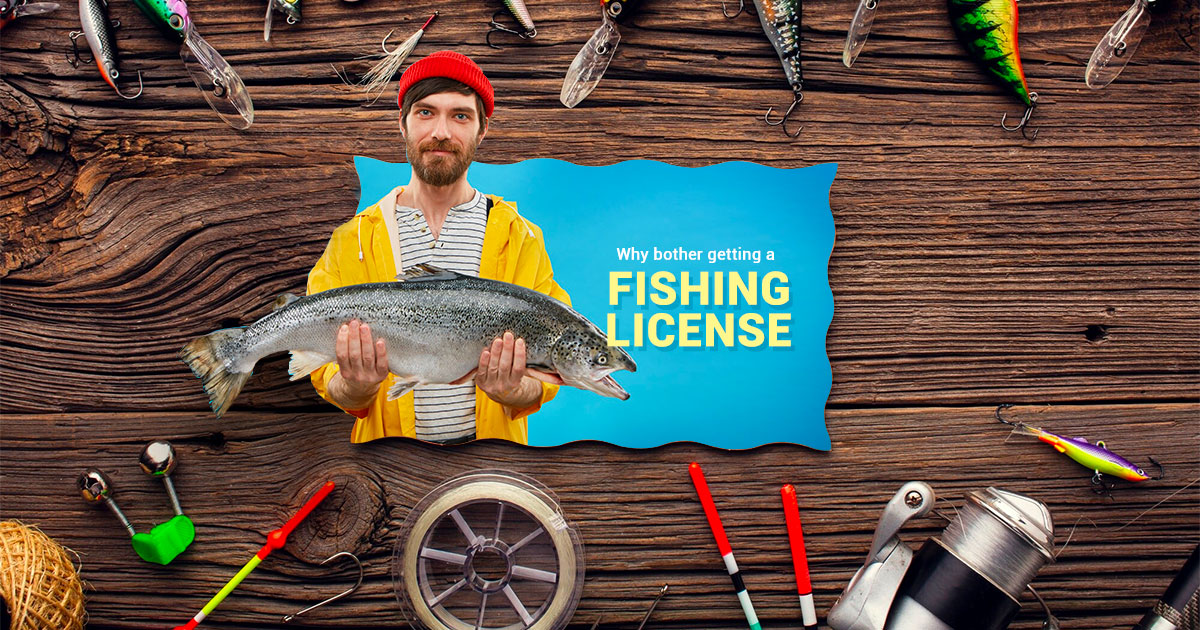7 Reasons Why You Need to Get A Fishing License to Fish

Fishing, a cherished outdoor pastime, offers relaxation and a connection with nature. However, one crucial question often arises: why bother getting a fishing license? This article aims to explore the importance of fishing licenses, shedding light on their necessity beyond legal compliance.
Is a fishing license needed to fish in the US?
Before diving into the multitude of reasons why obtaining a fishing license is crucial, it’s paramount to address the fundamental question, is a fishing license needed to fish in the US? The unequivocal answer is yes. In the majority of states, anglers are required to obtain a fishing license to legally engage in their favorite pastime. However, the significance of a fishing license surpasses the realm of legality, encompassing a broader commitment to environmental conservation and responsible angling practices.
What are the other reasons why you’ll need to get a fishing license?
1. Conservation and restoration
One of the primary and noblest purposes of a fishing license is to contribute significantly to conservation efforts. The fees collected from fishing licenses directly fund initiatives aimed at protecting, conserving, and enhancing fisheries resources. This financial support plays a pivotal role in maintaining healthy fish populations, improving water quality, and safeguarding critical aquatic habitats. Anglers, through their license fees, become active participants in the preservation of the delicate balance of aquatic ecosystems.
2. Access to fishing opportunities
Fishing licenses are not merely a legal requirement; they are gateways to providing and enhancing fishing opportunities. The funds generated from license fees contribute to ensuring access to well-maintained waters. This financial support aids in creating environments conducive to plentiful hauls, fostering a positive and sustainable fishing experience for anglers.
3. Sustainable economic opportunities
By obtaining a fishing license, anglers actively engage in sustainable economic opportunities. The revenue generated from these licenses plays a crucial role in supporting local economies that depend on recreational fishing and associated industries. From tackle shops to charter services, the economic ripple effect of fishing license fees is vital for the livelihoods of those connected to the angling community.
4. Public outreach and education
Fishing licenses serve as enablers for public outreach and education initiatives. These programs are designed to raise awareness about responsible angling practices, sustainable fishing methods, and the overall importance of preserving natural aquatic places. Through the dissemination of knowledge, fishing licenses contribute to creating a community of informed and environmentally conscious anglers.
5. Regulation and control
Beyond their financial contribution, fishing licenses serve as indispensable regulatory tools. They enable authorities to control and manage fishing activities effectively. Different types of licenses cater to various fishing scenarios, whether in freshwater or saltwater, ensuring adherence to specific regulations. This regulatory aspect is vital for maintaining ecological balance and preventing overfishing, thus safeguarding the long-term health of fish populations.
6. Funding research for conservation
The fees collected from fishing licenses play a crucial role in funding wildlife research. This financial support assists biologists in better understanding fish behavior, mating patterns, migration, and other essential aspects. The knowledge gained from such research contributes directly to the long-term conservation of fish species, ensuring their sustainable existence for future generations of anglers.
7. Setting an example for future generations
Obtaining a fishing license extends beyond the immediate benefits; it sets an example for future generations. By complying with licensing requirements, anglers instill a sense of responsibility and respect for natural resources in the minds of young enthusiasts. This legacy-building aspect ensures the continuation of a community of conservation-minded anglers, contributing to the preservation of aquatic ecosystems for years to come.
A fishing license is not just a legal document; it’s a commitment to the broader values of conservation, responsible angling, and the sustainable enjoyment of a beloved outdoor activity. As you cast your line into the waters, remember that your fishing license is a symbol of your dedication to the well-being of aquatic environments and the future of recreational fishing.
What happens if I fish without a license?
Now, let’s delve further into the repercussions of fishing without a license, addressing the legal implications and potential consequences anglers may face for violating state regulations.
Is it illegal to fish without a license?
Without a doubt, fishing without a license constitutes a clear violation of state regulations. Whether you’re casting your line into freshwater lakes, meandering streams, or braving the waves in saltwater bodies, a valid fishing license is a legal prerequisite. The act of fishing without this essential document undermines the structured system in place to ensure responsible angling practices.
Can I go to jail for fishing without a license?
The consequences of fishing without a license extend beyond mere fines or warnings. Depending on the state, and local laws, and specific circumstances, the severity of penalties can escalate, potentially leading to arrest. It is a critical juncture where the discretion of conservation officers comes into play, making it crucial for anglers to comprehend the potential legal ramifications.
The decision to pursue legal action, including arrest, hinges on various factors:
- State Regulations: Each state has its own set of regulations regarding fishing without a license. Some states may opt for stringent measures, while others might lean towards imposing fines.
- Individual Offense History: A recurrent pattern of fishing without a license may influence the outcome. A history of violations could lead to harsher penalties.
- Conservation Officer Discretion: The discretion of conservation officers plays a pivotal role. Their assessment of the situation, the angler’s intent, and cooperation may influence whether the consequences remain confined to fines or escalate to arrest.
Potential financial repercussions
To emphasize the gravity of fishing without a license, consider the potential financial repercussions. Fines, while varying among states, can range from modest amounts to hundreds of dollars. This financial impact can significantly strain an angler’s budget, making compliance with fishing license requirements a prudent and economical choice.
Legal proceedings and jail time
In severe cases, where an angler persists in fishing without a license despite warnings or fines, legal proceedings may ensue. This may involve court appearances, where the angler must address the charges and potential fines. In extreme circumstances, persistent non-compliance can lead to the imposition of jail time.
Therefore, the act of fishing without a license extends beyond a simple regulatory breach. It jeopardizes an angler’s financial stability, legal standing, and even personal freedom. To navigate the waters of recreational fishing responsibly, it is imperative to understand and adhere to fishing license requirements, respecting the laws in place to preserve the delicate balance of aquatic ecosystems. In doing so, anglers not only avoid legal complications but also contribute to the broader goals of conservation and sustainable fishing practices.
A fishing license is important if you love to fish
If you love to fish, obtaining a fishing license is not just a legal obligation; it is a commitment to conservation, responsible angling, and the long-term health of fisheries. A fishing license signifies more than permission; it represents a contribution to the well-being of aquatic ecosystems and the sustainability of a beloved outdoor activity.
As you head out for a day on the water, remember that your fishing license is not just a piece of paper; it is a symbol of your dedication to preserving the beauty of nature for future generations of anglers. So, why bother getting a fishing license? The reasons extend beyond legality; they encompass a shared responsibility to protect the waters we cherish.

